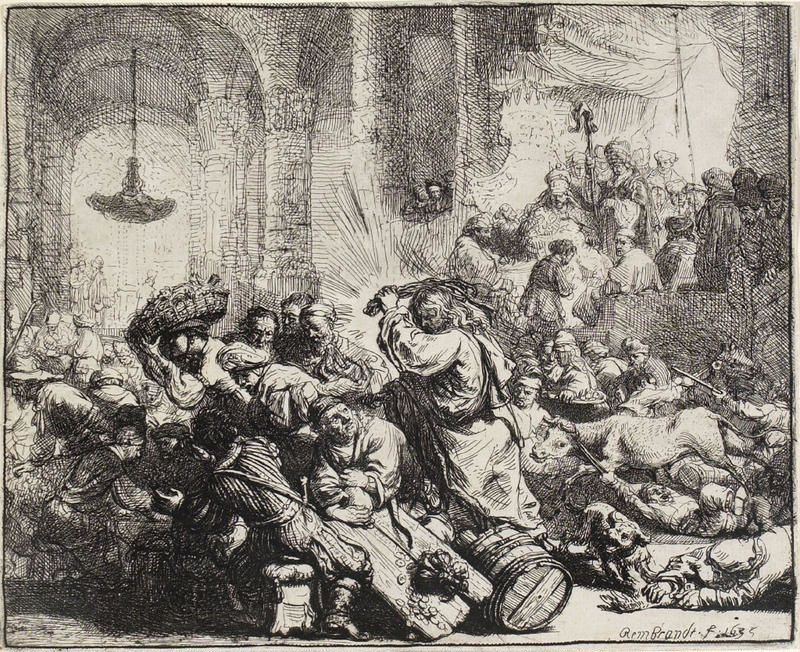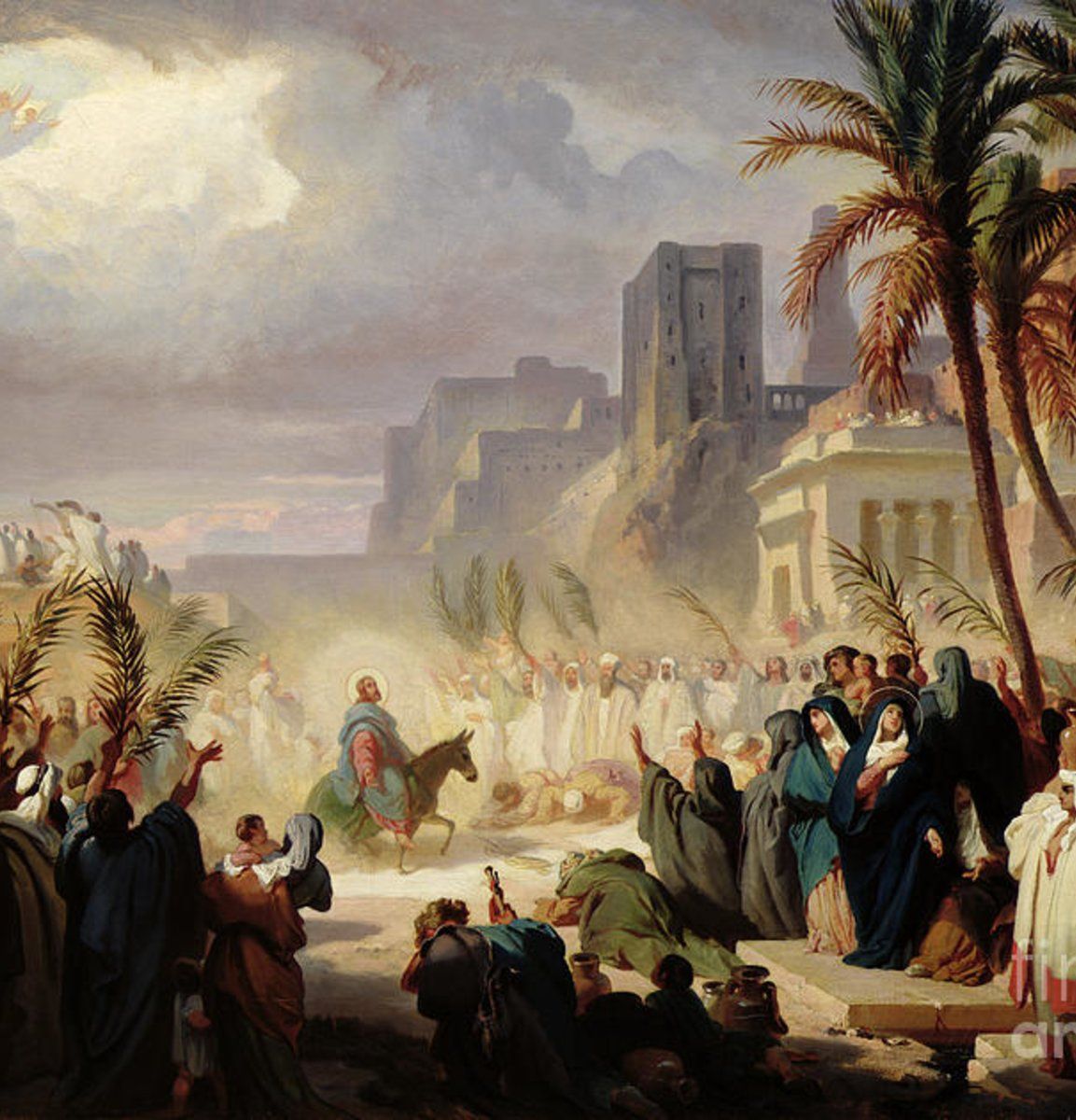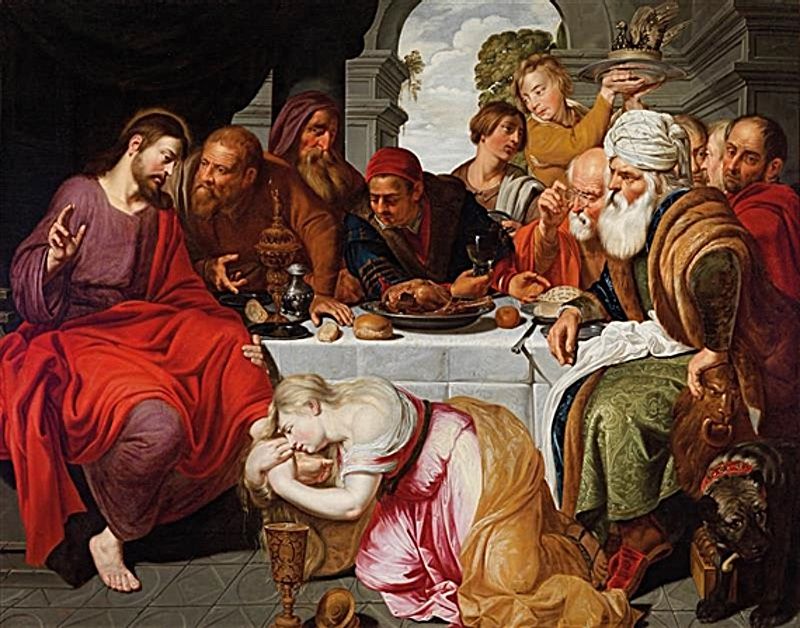
Why Did Judas Betray Jesus
Judas was the only disciple from the tribe of Judah. Jesus and King David were both from this tribe and all prophecies agreed that the Messiah would be from the king tribe of Judah. All Jews in the first century were looking for the emergence of the Messiah who would lead them out of the bondage of Roman rule and establish Israel as the premiere nation of God and the Jews as His chosen people. They were not looking to the Messiah as a spiritual leader. They had the High Priest for that purpose. Thus, Judas was looking for a Messiah that would attract grass roots support and then lead an uprising of such enormity that it would overwhelm and end the 96 year Roman occupation of Israel. When Judas first heard of an itinerate rabbi of the people who was charismatic, a prophet, healer and a scriptural scholar, he immediately became intrigued at the possibility that Jesus of Nazareth might very well be the long-anticipated Messiah in the making. He heard Jesus preach and seeing Him heal, decided to join the growing group of disciples in order to participate in the rise of Jesus as Messiah movement (Luke 6:12-16). His joining as a disciple would also ensure that he would receive a lucrative role in the eventual government of King Jesus.

He was constantly intrigued at how adept Jesus was with His use of rhetoric that both taught, entertained yet also tantalized listeners about a new and exciting age that was soon to come. He gave the people hope but at the same time intimated that this change of fortune revolved around Him with God’s help. And the best part was, all of this was done in broad daylight right under the nose of Rome who appeared to not understand that a populace uprising was in the making. Judas saw Jesus as the most cleaver man he had ever met! He was ecstatic about how fast the Jesus movement was growing. Jesus was soon drawing thousands to hear His sermons and using peace to accomplish change or as Judas would say, laying out His political methods and goals. He saw Jesus using His ability to apparently heal as another cleaver way to cause those supposedly healed to follow him like sheep to a shepherd. In fact, Jesus even used this very phrase to describe the type of faith a person needed to have for Him in order to enter into the coming Kingdom. For Judas, Jesus may or may not have been literally healing the simple-minded bucolic people in the countryside of Galilee, but as long as they thought they were healed, He had none the less gained their complete loyalty. And by supposedly healing thousands of people, He was in fact creating an army of loyal supporters. Judas knew it was just a matter of time before Jesus’ wave of popularity would be so overwhelming that the synergy would cause an overthrow of the Roman occupation. The only questions for Judas were when would this historic event occur, how would it be organized to achieve its goal and what would be the signs of its impending manifestation.
Judas never bought into the spiritual aspect of Jesus’ ministry (Matthew 20:17-20, Matthew 26:14-16; John 12:2-6, John 13:8-11). Many false messiahs had come and gone leaving Israel in the same depressed condition that it was already in. For Judas, it was only about freedom from Roman occupation, the number of fighters in the movement and organizational planning. Like a political campaign, they needed a charismatic leader, a vision, a plan to achieve that vision, financial backers and a dedicated army of workers that would unflinchingly follow orders. Jesus only needed to stay focused on the message which was the ushering in of a better life now and not in the sweet bye and bye. Jesus needed to focus on telling the people that in order to make their lives better, they must be willing to trust and follow Him. The healings, prophecies and clever moral stories were only insularly to the main attraction … Jesus as King.
In the short run, Judas saw people as more than willing to donate all their money to him if He would heal them or a loved one. He realized that these healing exhibitions were both a crowd draw and a money maker. And who better to serve as treasurer for the Jesus as King campaign than Judas himself (John 12:5-6, John 13:29). He no doubt volunteered for the position hoping he would later serve as Treasurer for the nation of Israel. As a bonus, Judas could and did regularly pay himself for time spent until the revolution occurred. And if it did not transpire, Judas would still have created a tidy nest egg with which to return home, buy some land and start a business. The apostle John apparently sensed Judas’ character and wrote that he was an immoral man and stole from the disciples treasury (John 12:6).
As the first year of Jesus’ ministry passed, the movement was growing exponentially. Judas saw this as a positive sign that the endgame was drawing ever nearer. As the second year came to a close, Judas probably started to became concerned that Jesus was now creating enemies in high places. The Chief Priests were becoming agitated that Jesus was preaching unapproved and unorthodox scriptural interpretations of long debated subject matter. More importantly, Jesus was becoming ever more publicly critical of the morality of the Temple, its priesthood, religious leaders and how it used unnecessary customs and laws to produce its enormous revenue flow. This public chastising of the Temple made Him very popular with the common man, but it could potentially upset the delicate balance between the Jewish state and the Roman Empire. The two had worked out a mutually satisfying agreement among themselves in which they both shared power and the revenue that power produced. Judas was probably in agreement with Jesus concerning the corruption of the Temple but why on earth was He going out of His way to alienate them at this time when He would soon need their support to ensure that the uprising and His ascent as King was successful. The Temple’s blessing on the Jesus for King movement would be very helpful in receiving the support of the far-right wing conservative Jewish population. The Temple was also the foundation stone of the nation. When Moses came down from Mount Sinai, he not only had the 10 Commandants in one hand, he also had the Temple architectural plans in the other. There could be no King that did not have Temple support. Otherwise, there would be a civil war on this issue.

It what was in the third year of Jesus’ ministry that Jesus’ outrage and lack of respect for the Temple began to cause not only rancorous public debates with religious leaders but also organized plots by them on how to embarrass, discredit and remove Jesus from public view. Rome was not particularly interested in Jesus at this time. The Roman Temple guards were probably even amused as they watched from their towers Jesus chastising the Jewish Temple vendors and overturning their tables. Watching Jews crawling on the ground trying to pick up lose change while other Jews tried to steal it from them was amusing. And watching the venders chasing birds, sheep and goats around the Court of the Gentiles probably made them laugh out loud. Roman records state that the Jews were the most disagreeable people that Rome ever conquered. They were apparently always complaining about Rome, the Temple and each other.
However, it was during this time period that the Temple suspected that Jesus was in fact purposefully building a following of His own. Itinerate rabbis had traditionally had young devotees follow them in order to grow in scriptural knowledge. They were no doubt devoted to their rabbi but the focus was always on the sacred Torah. Jesus seemed to be diverging from orthodox teachings and the focus was on Him, God as His personal Father and His apparently new improved vision of the Temple system. This new system was kinder and gentler without all the customs and laws. Instead, it seemed to be reverting back to the time of the patriarchs when they were accounted as righteous in the eyes of God thorough faith plus nothing else (Genesis 15:6). This idea of replacing the Temple system would not be tolerated. It had taken 1,500 years to establish the Temple’s multiple revenue streams to support the priesthood and their business ventures. No itinerant rabbi was going to question its legitimacy and authority. It would be better that this person die than the Temple system be destroyed (John 11:50). The religious authorities knew that the nation’s citizens had a long sad history of being easily duped. It was to be expected that uneducated rural people would follow a charismatic rabbi who was telling them what they wanted to hear and performing magic tricks. But the religious leaders knew how to handle a delusional, self-aggrandizing rabbi. They only needed to trip Him up by asking Him a few well-constructed questions, arrest Him for answers that broke Jewish or Roman Law and then imprison Him. They also understood the intricacies of the delicate peace agreement they had negotiated with Rome and there would be no tolerance for a zealot rabbi from the sticks stirring up the public.
As long as there was peace, Rome would turn a blind eye to the Temple system. However, if there was even a slight hint of an uprising, Rome would immediately and viciously attack and kill as many Jews as it would take to reinforce its motto. And that motto was short and simple, there must always be peace and there is no king but Caesar. And if that motto was not kept, Rome would do what they had done so many times before with other rebellious territories.
They had perfected a system whereby they would deconstruct a rebel territory, its people and its culture. To do this they would conduct a mass execution of the provinces political officials, religious leaders and anyone who participated in the insurrection. Then they would take the young people to distant lands and sell them as slaves. The rest of the population would be broken up and resettled in distant providences where they would be forced to learn a new language, customs, dress and religion. They would then send Roman legions into the land and over a period of years, pull down every religious center, rebel stronghold and every culturally significant building leaving nothing but the foundation stones. Then they would take sledge hammers to the fallen cut stones and break them up so they could never be reused again. Next, all civil records of the country would be burned and finally, the name of the country would be officially changed on all maps. Ultimately, it would be as if the country never existed. The Jewish leaders were well aware of Rome’s no tolerance policy and they were not about to let Jesus and His rag tag crew of blue-collar Galilean followers destroy a 1,500-year-old lucrative religious system.
It was in the last few months of the ministry that Judas began to have serious doubts about the leadership qualities of Jesus. The man he had observed for over three years was a good, smart and honest person, but He had become reckless as a leader. He had unlimited promise but had seemingly lost His focus as to the ultimate purpose of His mission. Judas’ doubts and disappointments were based on a series of events that left him more and more confused, disappointed and eventually publicly embarrassed.
First and perhaps foremost, Jesus simply refused to state if He was in fact the Messiah. He had apparently told a Samaritan woman at Jacob’s well that He was the Messiah but none of the disciples were actually present to hear Him make this statement (John 4:25-26). So, this supposed announcement by Jesus was only heard by the woman thus at best it was only hearsay. His public followers continually referred to Him as the Messiah and some even asked Him to his face if he was in fact the Messiah. But Jesus refused to give them a straightforward answer. At first His coy way of answering this question with a question was seen by Judas as appropriate. He saw this as a clever way to confirm their suspensions without actually answering their questions in the affirmative and thus not drawing attention from the religious leaders and Rome. Jesus would say, who do you think I am? Or, you have seen and heard me, who am I in your opinion? But over a three year period, this cat and mouse game of semantics had worn on Judas’ nerves. The other disciples respected Jesus too much to come right out and ask Him. But Judas was now ready to know for certain who Jesus thought He was even if he had to put his own plan into action that would force Jesus to answer this question.
Next there was the question concerning should the people of Israel pay Roman taxes. Judas saw this as a simple question with a simple answer, No! But once again Jesus skirted the issue by saying that the people of God should, “give unto Caesar the things that are Caesar’s; and unto God the things that are God’s” (Matthew 22:15-22). Judas could see that this was once again a cleaver answer but not the right answer. Why should God’s chosen people pay extra in taxes to a pagan occupier of God’s land. Then there were the times when Jesus would talk to, comfort and even have dinner with prostitutes, tax collectors, the poor and diseased. He even healed a gentile Roman military leader’s daughter. As far as Judas was concerned, Jesus was actively aiding and abetting an enemy of Israel. At the same time, Jesus showed contempt for the wealthy, well connected elders, religious leaders and Temple staff. Yet these were the very people He would need to ensure the revolution was successful. He even went so far as to publicly announce that His followers were forgiven for their sins. What was He thinking! Only God Himself can forgive sins. Was Jesus in a roundabout way implying He was God? Judas believed that Jesus was committing blasphemy after blasphemy and breaking one Jewish Law after another. Then there was the disastrous speech made by Jesus where He said, “Truly, truly I tell you, unless you eat the flesh of the Son of Man and drink his blood, you cannot have eternal life in you.” (John 6:53). Judas found this sermon both disturbing and disgusting. It broke all Jewish Laws concerning food purity and caused the majority of followers who heard Him make this statement to resign from the Jesus movement and return to their lives as Jews and pagans.

Then there was the event in which Jesus asked His disciples who did they think He was. There was a deafening silence because the disciples were not exactly sure of the answer. They were hoping to hear a definitive answer to this question from Him. Instead, Peter spoke up and said, “You are the Christ, the Son of the living God.” (Matthew 16:13-19). This would have captured the imagination of the 11 but Judas found this very disturbing for two reasons. First Jesus did not actually say that Peter was right but instead congratulated him on his astute conclusion. Second, Jesus then immediately stated that He would build His church on this understanding of who He was (Matthew 16:18). Where did the idea of a new church come from? Was Jesus saying He was going to replace the Temple? And last but not least, if Jesus was affirming that He was in fact the Son of God, this would imply that He was worthy of worship. This idea would have caused Judas to totally recalculate His future plans with the ministry. Jesus as King yes, Jesus as God, no!

Judas came to understand that he needed to step in and force Jesus’ hand because of three final events. First, on the Sunday before Passover, Jesus rode into Jerusalem riding on the back of a colt. There was not a man, woman or child in all of Israel who did not know this prophecy made by prophet Zechariah (Zechariah 9:9). This had the effect of causing a brief but intense frenzied response by the crowds who witnessed this event. The problem for Judas was that the planning stage of the revolt was not even remotely in place. His arrival may have excited a few thousand Jewish peasants to scream Hosanna but what did that accomplish? Judas saw this whole event as foolhardy and one that could very well jeopardize all the hard work and progress the movement had made over the past 40 months. And as if that was not enough for one day, Jesus then walked into the Court of the Gentiles and started overturning the merchandise table of the various venders. He then spent Monday through Wednesday publicly teaching in the courts of the Temple and constantly calling the priests vipers and rotted corpses intentionally misleading the people in an effort to extract as much money for themselves as possible. He even announced that their father was Satan! Why would he knowingly go out of his way to engender the ire of the Temple staff and the attention of Rome. This was all seen by Judas as multiple spontaneous actions by Jesus that were only detrimental to the cause. He had gained nothing except to have now put Himself and His disciples in very real danger. Rome was well known for executing people who caused civil unrest and Judas did not want to fall into that category. Jesus was no longer a man Judas could look up to nor pin his hopes on concerning his future goals of wealth and power. Jesus' climb to fame was reaching its climax, yet at the same time Judas’ faith in Jesus was at an all-time low. He saw Jesus as so focused on crowd appeal and disgust for the Temple that He had become blind to the overt threat of the religious leaders and Rome working together to end the civil unrest He had created. He saw the other disciples becoming a cult of personality by now thinking of Jesus as God. As far as Judas was concerned Jesus was either the next King David or He was not. Further, Jesus was now leading His disciples down a path of disappointment and martyrdom.
On the other hand, Judas was a survivor and still capable of looking out for number one. He saw himself as the only disciple still clear headed enough to see the train had come off the tracks. He was now determined to at least try to save the lives of Jesus and his deluded disciples. Because of his plan, maybe they would be offered jobs in the Temple or maybe they would be tried, convicted and excommunicated from returning to Jerusalem. Maybe they would be imprisoned or possibly exiled. In any case, at least he has tried to help them before he moved on with his money, his new life and a clear conscience.
Judas has put away a nest egg embezzled from the ministry’s treasury, but it would do him no good if he was going to be crucified by the Romans or murdered in his sleep by Temple assassins. If he got out now, he could return home and explain that he had been misled by a false messiah then use his ill-gotten gains to start a new life. But he had a nagging suspicion that Jesus was just too smart not to have some plan up His sleeve. Judas decided it would behoove him to try and force Jesus’ hand to learn if there was a plan and then he could better assess whether to stay and continue to be a part of Jesus’ rise to the throne of Israel, or resign from the ministry and go home. He knew for sure he could not bear a fourth year on the road. And, he knew that the window of opportunity was closing if he wanted to enact a plan before Passover.
It was now Wednesday and Passover would begin in two days or Friday evening. He suspected, as did the Temple authorities, that Jesus was most likely going to make his move and announce he was the Messiah at that time. And he knew that this would cause a catastrophic reaction within Jerusalem and Rome. The movement was completely unprepared to initiate a successful revolt at this time. The whole Jesus movement would implode and the body count would be high. So, he decided to use what he saw as his considerable intellect to develop and put in action a plan that would force Jesus to reveal His secret plan, save their lives, make one last deposit into his saving account and last but not least, no one would know of his involvement. Judas thought he had developed a simple yet fool proof plan that would be a win- win for everyone involved. But in fact, it would cause him to become known as the most infamous traitor in history. Yet, in a counter intuitive way, unleash the most powerful series of events since the creation of mankind.

There was a final incident that took place on the Wednesday evening before Passover that caused Judas to put his plan into action later that night. Jesus was staying in the village of Bethany just a few miles from Jerusalem. He was invited to a supper to be held at the house of Simon who was healed of his leprosy by Jesus. Martha, Mary and their brother Lazareth who had recently been raised from the dead by Jesus were also there and probably helping with food preparation. Before the supper, Mary stood up and began to anoint Jesus’ head and feet with a very expensive perfumed oil. Judas felt He had the responsibility to confront Jesus out of righteous indignation. He saw the anointing act as wrong on three different counts and so he felt obligated to point out the obvious.
First of all, it was against Jewish law for any woman to touch a rabbi in public. This included even his wife and daughter. Second, simple inexpensive olive oil would have been more than good enough to perform this needless gesture towards Jesus. But this woman used a refined oil mixed with nard, a perfume that was extremely expensive and, she used an entire bottle on Jesus. Judas felt this oil would have been better used by selling it to increase his treasury account (John 12:2-6). Third, the woman was by her actions implying that she was worshiping Jesus. For Judas, this had become a mind-numbing idea. Judas could no longer hold back His anger and confronted Jesus on this action that he considered obscene on multiple levels. He was no doubt surprised and publicly embarrassed when Jesus turned on Him and told Him in effect, he should be ashamed of himself for questioning this simple act of kindness. He told Judas that her act that night would be remembered wherever the Gospel was preached (Matthew 26:13). At the same time, Jesus was implying that his hard hearted act of insolence would also be remembered down through the ages. Judas felt he had been publicly mocked by Jesus for saying out loud what some of the other disciples were also thinking (Matthew 26:6-13; John 12:3-8). He was now through following the man Jesus had become. Apparently, the movement was now only about Jesus as God and not a mortal King as was David. And it was obviously no longer about showing respect for Jewish law and tradition. This was the final straw!

It would be immediately following the Wednesday night meal or more probably early Thursday morning that Judas would meet with the Jewish Priests. He would at that time negotiate what he considered an appropriate finder’s fee for arranging to have Jesus “safely” taken into custody to meet with the High Priest Caiaphas (Mark 14:44; Matthew 26:14-16). Scripture suggest that he had not previously had contact with the Temple until this time. So, the public chastisement Wednesday night by Jesus concerning the anointing must have been the tipping point for Judas. Thus, just as Mary’s act of love and loyalty was recorded on that night, so too was Judas’ act of hate and disloyalty also recorded on that night. Mary anointed Jesus in preparation for His death and burial. Judas’ actions would ensure that Jesus would in fact be killed. Judas thought that Jesus and Caiaphas could come to some amicable solution and defuse this dangerous political and religious quagmire Jesus had gotten Himself and the disciples into. If not, Judas had done what he could and the results were Jesus’ problem. Now Judas only needed to find out when and where Jesus would be alone and away from the Passover crowds on Thursday. Only then could He be peacefully taken into custody and finally forced to answer the question on everybody’s lips ... who did Jesus think He was?
If you enjoy the information provided on this site, please consider making a donation of any amount to help continue its production. Donate Now